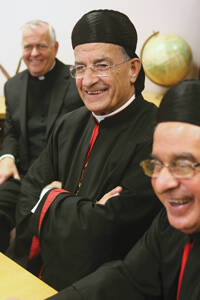With world headlines tracking a breathtaking rate of change as the Arab Spring turned into an autumn of violence in Egypt, Syria, Yemen and Libya, the new Maronite Patriarch Bechara Peter Rai cautiously welcomed the political movement’s potential for transforming the region. But, he warned, “We must remain vigilant.”
“The church abhors the use of violence to meet any goal,” he said. “We want to see a Middle East renewed in its respect of human rights and dignity, especially for minorities.”
Patriarch Rai, 71, was elected on March 25 as the leader of the Lebanon-based Maronite Church, the largest of the six Eastern Catholic patriarchal churches. At the close of a tour of the United States, before a visit with U.N. Secretary General Ban Ki-Moon in New York on Oct. 20, the patriarch expressed worry about the possible implications of the changes roiling the Arab world on the region’s Christians. Just days earlier a demonstration by Egyptian Copts in Cairo demanding protection ended in violence that left almost 30 people dead. As the patriarch spoke in the headquarters of the Catholic Near East Welfare Associa-tion, rebel forces in Libya were closing in on one-time strongman Muammar el-Qaddafi; violence flared in Yemen; and a government crackdown on the opposition persisted in Syria.
The patriarch said Americans should understand that the region’s Christians “wish the Arab Spring to be really an Arab Spring. We wish the countries to adopt a separation between religion and state, the system that Lebanon has adopted, which respects all religions and all the values of each religion.”
Discussing the plight of Egypt’s Copts and the devastation visited on Iraq’s Christian community in recent years, the patriarch said that unless Arab nations support religious freedom and respect human rights, the Arab Spring movement will devolve into an “Arab winter.”
“We wish to see freedom being practiced in [Arab] countries. We wish to see all the values of human rights and democracy implemented in those countries,” he said. “It is not easy to talk about democracy in the Western sense in countries that have a theocratic system. Christianity divides politics and religion, and we wish Islam and other religions to do the same,” Patriarch Rai said. Failure to do so will result in civil wars, like the one in Iraq, he warned, and will lead to the rise of regimes “that are even more fundamentalist. This is something that will be to the detriment of everybody.”
Patriarch Rai said conflicts between Israel and the Arab countries and between Israel and the Palestinians have had a negative impact on the region’s Christians.
“The Arab-Israeli conflict is at the level of religion and culture. The conflict between the Palestinians and the Israelis is a conflict [about] a people whose sovereignty, whose land, was taken away, who were displaced and for 64 years have been promised by United Nations resolutions a right of return, but this has not happened,” he said.
“The atmosphere that was created by those conflicts has impacted the Christian presence in the Middle East, causing some to leave for economic and security reasons,” he said. “There will be no peace in that part of the world until Judaism, Islam and Christianity separate church and state,” he said.
Patriarch Rai said that in Lebanon, 18 distinct religious groups live together, a sign of hope for people of the region.








